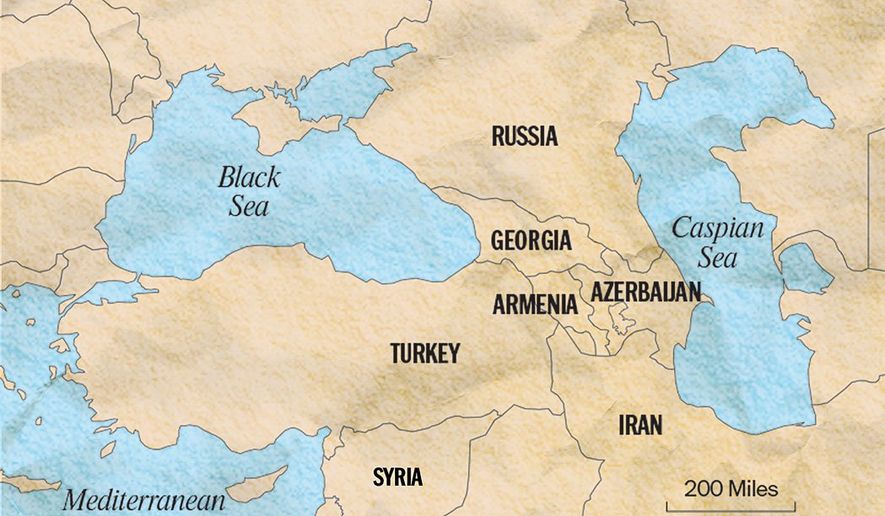OPINION:
Renewed hostilities in Ukraine in recent days once again underscore what is at stake for the Black Sea region as a focal point for competing geo-political powers. The Black Sea serves as a buffer along Europe’s southern flank, helping to protect Europe, NATO and vital U.S. interests from hostile powers.
At the same time, the Black Sea is also becoming the crossroads of high value trade seeking the fastest route from Europe to Asia and Asia to Europe, including sizable amounts of American exports, and it figures in the geography of critical energy pipelines to Europe and world markets.
Russia sees this strategic waterway as its entrance to the distant fronts it covets, for example Syria, North Africa and parts of the Eastern Mediterranean. But to move beyond the Black Sea, or to prevent others like the United States from entering it, Russia must exert pressure on other Black Sea states that lie near the Bosporus, the snake-like waterway that links the Black Sea via Turkey to the larger oceans to the south.
Russia’s seizure of Crimea from Ukraine intensified this pressure. Before this, in 2008, it occupied approximately 20 percent of Georgia’s territory, including Georgia’s critically strategic coastal territory of Abkhazia. Russian illegal occupation of our land remains to this day. Russia’s efforts to destabilize the Balkans, especially the Black Sea countries, are well documented. Russia need not occupy these NATO members to advance its Black Sea strategies.
Three NATO members border the Black Sea: Romania, Bulgaria and Turkey; and an associate member of NATO, Georgia. Geo-political security in the Black Sea is a challenge that cannot be solved without Georgia’s support. Georgia’s geography, its defense and security attachments, and its proven commitment to Western and trans-Atlantic objectives make it an essential pillar of emerging strategies for NATO cooperation.
The United States has been a relentless supporter of full NATO membership for Georgia, for which we are grateful. U.S. policymakers like U.S. Secretary of Defense Mark Esper also recognize Georgia’s unique ability to play a vital role in the Black Sea. Black Sea stability, as well as other emerging security and defense issues, were the centerpiece of our recent meeting at the Munich Security Conference. Mr. Esper emphasized the importance of U.S.–Georgia defense cooperation as a critical part of the solution to these emerging challenges. Georgia already spends more than 2 percent of its GDP on defense, and whenever the U.S. or NATO seek support we answer the call.
Alluding to the growing need for Black Sea security and a united NATO front to address the challenges, at the recent Davos gathering, Turkey’s foreign minister, Mevlut Cavusoglu, called for immediate, full NATO membership for Georgia. President Recep Tayyip Erdogan reiterated Turkey’s and NATO’s commitment to Black Sea security during his recent visit to Ukraine. Turkey has also long understood that the Black Sea is the geopolitical center of the region’s strategic context.
Russia continues to oppose full NATO membership for Georgia. Now is the time for NATO to answer our call for membership. Georgia has been promised full membership repeatedly by NATO’s leadership, and we remain hopeful that challenges to our NATO accession will be overcome — and soon. More Georgia in NATO and more NATO in Georgia will strengthen Black Sea and Western security and also strengthen Georgia’s democracy and growing economy.
In the meantime, Georgia will continue to work closely with the United States and other NATO members to strengthen Black Sea security. In the last few years, this has meant providing well-trained troops for NATO operations, along with expansion of NATO and U.S. defense activities, including new installations and frequent joint military exercises, on the territory of Georgia. We seek greater expansion of joint-exercises, more port calls and further development of our maritime infrastructure to bolster Black Sea security.
Georgians are justifiably proud that we provide outsized contributions to the vital trans-Atlantic alliance. We seek to demonstrate our deeply-rooted attachment to Western civilization and values through practical acts that strengthen both our resolve and our defenses against those who do not share them. Black Sea security is essential to global peace and stability, and Georgia is a steadfast partner in Western solidarity. For those reasons, our NATO friends should deliver on the promise of Georgia’s entry into this vital security organization.
• Giorgi Gakharia is prime minister of Georgia




Please read our comment policy before commenting.